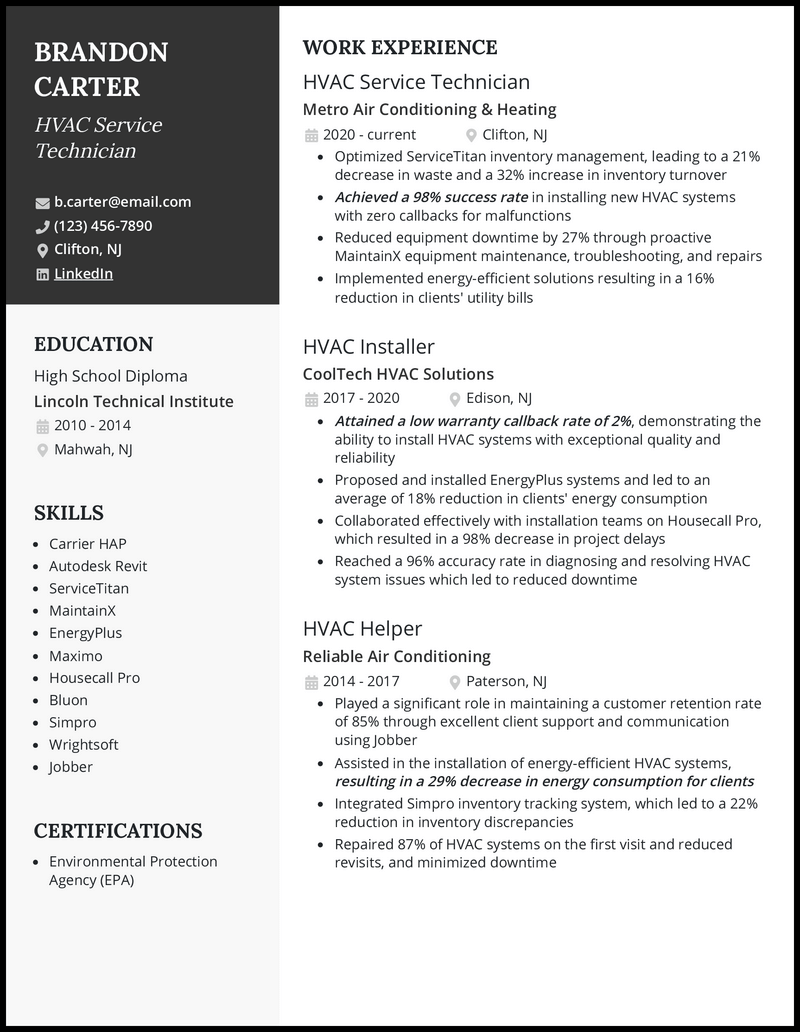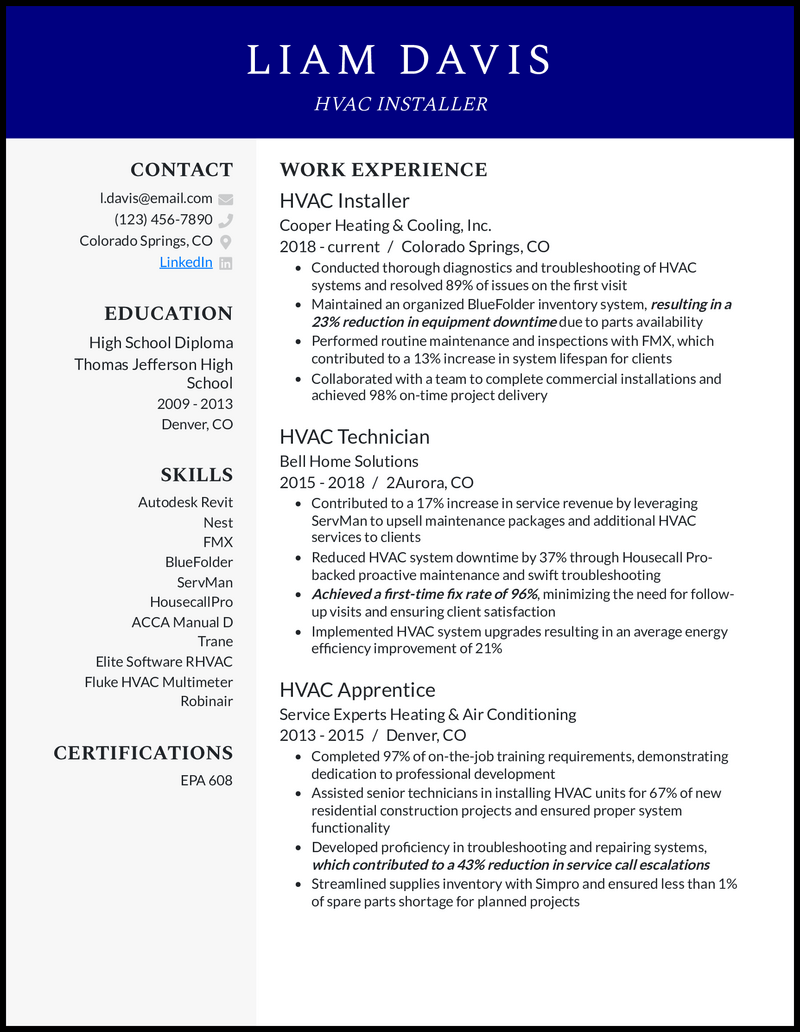As an HVAC specialist, you’re intimately familiar with the ins and outs of mechanical and electrical systems. Not only that, but you also know how to work them to ensure homes and offices are safe and comfortable spaces all year round.
Whether your expertise lies in installing, servicing, or maintaining HVAC systems, if you want to take your career to the next level, you’ll need to build your resume and complementary HVAC cover letter that concisely show off your impressive skill set.
Good news—we’ve analyzed hundreds of resumes and job listings in your industry and are here to share our findings. Our sample HVAC resume examples, tips, and cover letter generator will help you land your desired job.
Why this resume works
- Reliability and quality services are two things that will keep your phone busy as clients call to request your heating and cooling system installation services. To be on clients’ speed dial, you must ensure a perfect record of the installations.
- And to be sought after by hiring managers, ensure your HVAC resume emphasizes your excellent service delivery record leading to highly-satisfied clients wherever you’ve been.
Why this resume works
- Your HVAC apprentice resume can’t be complete without a highlight of your education and skills. Ideally, it should be a technical course or school (Cue Robert’s mention of Brooklyn Technical High, which specializes in engineering, technology, science, and mathematics). Otherwise, highlight a technical diploma or degree.
- Better yet, include your industry-pertinent certificates (think EPA 608 and Air Conditioning Service certifications) just below the education section. These validate your competence and commitment to professional growth and industry standards.
Why this resume works
- Feeling a tad overwhelmed at the thought of writing your entry-level HVAC resume? Tell you what, call attention to transferrable skills you’ve picked up elsewhere and stand a good chance of knocking the recruiter’s socks off.
- Now, dive into that job ad and play detective. You want to identify soft skills that sync up with what you’ve got (we’re talking time management, collaboration, and adaptability), as well as tools (think leak detectors, multimeters, thermal cameras, and ductulators). Next, demonstrate applications of these proficiencies generously in your Work Experience or Projects sections—it’s a smart move that could give you a leg up on the competition.
Why this resume works
- So, you’ve seen the ad for that open HVAC project manager role and want to toss your hat in the ring? Great! Tailoring your resume to spotlight your standout skills could be the winning strategy.
- We’re talking about an HVAC project manager resume that zeroes in on your leadership acumen, initiative, and cost-saving prowess. However, keep the narration logical, interesting, and clear—that’s the way to capture a recruiter’s attention.
Why this resume works
- For an HVAC engineer resume, capitalize on your role in saving project costs, reducing energy consumption (efficiency), and cutting operational costs. When backed up with real numbers (then highlighted by bolding, underlining, or italicizing), such feats will make you noticeable to the hiring manager.
- The essence? It’s about presenting yourself as a result and solution-oriented HVAC engineer with a proven history of delivering tangible outcomes in an industry focused on minimizing carbon footprints and operational costs without compromising customer satisfaction.
Why this resume works
- Being a seasoned and highly-skilled technician is a good quality that employers are looking for. However, it’s only an exceptionally talented expert who can successfully transfer technical skills to entry-level recruits.
- As such, highlighting how you mentored junior trainees in your HVAC technician resume will ensure your application for the job is successful.
Why this resume works
- There’s only one way of ensuring your HVAC services are sought-after by clients: promptly responding to issues and ensuring an almost zero record of downtimes.
- So, when looking for a job, ensure your HVAC installer resume emphasizes your input toward 360-degree service support to customers while achieving zero-rate system downtimes, and you’ll be hired ahead of everyone else.
Fine-tune Your HVAC Resume for Each Job Application

Through your training and experience in the industry, you’ve accumulated a well-rounded skill set. Thanks to this, you go from optimizing systems using tools like Trane Trace 700 to interpreting and following blueprints to carry out installations, all without breaking a sweat.
Your job hinges on a deep technical understanding of HVAC systems and efficiently making the most of all the tools at your disposal. This is why it’s best to zone in on the technical side of it when you discuss your skills in this section.
Dive into your familiarity with FieldEdge, your focus on safety compliance, and your AutoCAD prowess. Swap skills in and out based on what the job description calls for.
Need some ideas?
15 best HVAC skills
- System Diagnostics
- System Installation
- Electrical Wiring
- Code Compliance
- Equipment Testing
- System Calibration
- Troubleshooting
- Load Calculation
- FieldEdge
- AutoCAD
- Trane Trace 700
- HVAC-Calc
- UpKeep
- HVAC BizPro
- QuickBooks

Your HVAC work experience bullet points
Whether you service HVAC systems or design and plan their installation, you’ve got your hands full making sure that everything runs smoothly.
Your work revolves around using various tools and tests to analyze the performance of the systems using key metrics. Your resume should be similar, as your goal is to show off the impact of your achievements using relevant metrics.
As an example, you could mention the sheer number of HVAC systems you installed or carried out preventative maintenance on, or the performance improvements you oversaw. Adding concrete figures will give those achievements more weight.
- Highlight instances where your work servicing or maintaining HVAC systems led to improved system performance or efficiency.
- Emphasize your knack for optimizing inventory management, highlighting your lowered stock discrepancy or wasted parts.
- Spotlight the number of systems you’ve worked on, and highlight the average energy cost savings you’ve delivered to your customers.
- Show your business acumen by talking about how you leveraged tools like FieldEdge to streamline and optimize job scheduling to achieve higher job completions.
See what we mean?
- Reduced equipment downtime by 27% through proactive MaintainX equipment maintenance, troubleshooting, and repairs
- Achieved a 22% reduction in response time to HVAC service requests by efficiently managing work orders and prioritizing urgent tasks
- Performed routine maintenance and inspections with FMX, which contributed to a 13% increase in system lifespan for clients
- Collaborated with a team to complete commercial installations and achieved 98% on-time project delivery
9 active verbs to start your HVAC work experience bullet points
- Diagnosed
- Reduced
- Achieved
- Conducted
- Leveraged
- Performed
- Improved
- Installed
- Facilitated
3 Tips for Writing an HVAC Resume if You’re Just Starting Your Career
- Emphasize your certifications
- Certain certifications, such as the EPA Section 608 Technician Certification, are typically required. However, if you have additional certs, for instance, the North American Technician Excellence (NATE), highlight them to impress recruiters.
- Discuss your soft skills
- It’s a good idea to demonstrate skills like communication, customer service, and problem-solving through your work experience bullet points. Discuss collaborating with coworkers at previous jobs, learning from senior colleagues during apprenticeships, or working directly with customers.
- Highlight your safety training
- Show your commitment to the constantly evolving industry safety codes and standards by noting any training you’ve had in safety protocols, such as an OSHA certification. This will highlight that you’re well-aware of how important safety is in an industry such as yours.
3 Tips for Writing an HVAC Resume if You Have Some Experience
- Demonstrate your leadership
- If you have any experience driving or supervising projects or mentoring junior technicians, highlight them. You set yourself apart from other candidates by providing evidence that you’re a strong leader.
- Showcase your specializations
- Dive into the details of any HVAC specializations you may have, along with relevant tools and procedures. Mention whether you’re well versed in both commercial and residential systems, or focus primarily on residential air conditioning and refrigeration.
- Discuss budget management
- Highlight your experience successfully managing budgets and resources to demonstrate your appreciation and understanding of the bigger picture. This shows the financial value you can bring to the company on top of your industry-specific expertise.
If you’re starting out, a career objective can be a good idea to express your interest in that particular HVAC role. Make sure to tailor it to each application, mentioning the role and company by name, and include an example career path that you’d like to follow within the company.
Read each job description carefully and fine-tune your resume to hit relevant keywords. For instance, if a job role stresses the importance of AutoCAD and schematic reading, make sure those skills are in your resume, too.
If you have a history in another field, like plumbing or electrical work, highlight transferable skills. For instance, talk about how your physical stamina, problem-solving, and understanding of electrical systems from your time as an electrician would serve you well as an HVAC technician.












